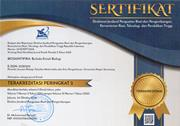Virtual Experiments of DNA Isolation and Hybridoma Techniques to Improve Students' Critical Thinking Ability
(1) Department of Integrated Science, Faculty of Mathematics and Natural Sciences, Universitas Negeri Semarang, Indonesia
(2) Department of Integrated Science, Faculty of Mathematics and Natural Sciences, Universitas Negeri Semarang, Indonesia
(3) Department of Integrated Science, Faculty of Mathematics and Natural Sciences, Universitas Negeri Semarang, Indonesia
(4) Department of Integrated Science, Faculty of Mathematics and Natural Sciences, Universitas Negeri Semarang, Indonesia
(5) Department of Integrated Science, Faculty of Mathematics and Natural Sciences, Universitas Negeri Semarang, Indonesia
Abstract
Keywords
Full Text:
PDFReferences
Anggraeni, L. (2011). Penerapan metode studi kasus dalam upaya meningkatkan kemampuan berpikir kritis mahasiswa pada mata kuliah hubungan internasional. Media Komunikasi FPIPS, 10(2).181-195
Aryanti, F. (2017). Penerapan problem based learning (PBL) berbantuan teknologi informasi dan komunikasi untuk meningkatkan kemampuan berpikir kritis siswa pada konsep pencemaran lingkungan. Biosfer: Jurnal Biologi dan Pendidikan Biologi, 2(1), 14-20.
Bahasoan, A. N., Ayuandiani, W., Mukhram, M., & Rahmat, A. (2020). Effectiveness of online learning in pandemic COVID-19. International journal of science, technology & management, 1(2), 100-106.
Creswell, J. (2015). Riset pendidikan: Perencanaan, pelaksanaan, dan evaluasi riset kualitatif & kuantitatif. Yogyakarta: Pustaka Pelajar.
Datey, S. H., & Kuthe, S. S. (2015). Development of Recommendation System for Selecting a Proper Sampling Technique for Researchers in Management Based On Objectives of Research & Study Population. International Journal of Electronics, Communication and Soft Computing Science & Engineering (IJECSCSE), 351-356.
Dini, J. P. A. U. (2021). Efektivitas Pembelajaran Online Pendidik PAUD di Tengah Pandemi COVID-19. Jurnal Obsesi: Jurnal Pendidikan Anak Usia Dini, 5(1), 686-697.
Estriegana, R., Medina-Merodio, J. A., & Barchino, R. (2019). Student acceptance of virtual laboratory and practical work: An extension of the technology acceptance model. Computers & Education, 135, 1-14.
Facione, P. A. (2011). Critical thinking: What it is and why it counts. Insight assessment, 1(1), 1-23.
Ferri, F., Grifoni, P., & Guzzo, T. (2020). Online learning and emergency remote teaching: Opportunities and challenges in emergency situations. Societies, 10(4), 86.
Hidayati, N., Pangestuti, A. A., & Prayitno, T. A. (2019). Edmodo mobile: developing e-module biology cell for online learning community. Biosfer: Jurnal Pendidikan Biologi, 12(1), 94-108.
Husnawati, A., Hartono, H., & Masturi, M. (2019). Pengembangan Soal Higher Order Thinking Skill (HOTS) Fisika Kelas VIII SMP Materi Gerak Pada Benda. UPEJ Unnes Physics Education Journal, 8(2), 133-140.
Khotimah, R. P., & Sari, M. C. P. (2020). Pengembangan Lembar Kerja Peserta Didik Berbasis Higher Order Thinking Skills (HOTS) Menggunakan Konteks Lingkungan. Jurnal Aksioma, 9(3). 761-755.
Kuntarto, E. (2017). Keefektifan model pembelajaran daring dalam perkuliahan bahasa Indonesia di perguruan tinggi. Indonesian Language Education and Literature, 3(1), 99-110.
Lin, H. C., Hwang, G. J., Chang, S. C., & Hsu, Y. D. (2021). Facilitating critical thinking in decision making-based professional training: An online interactive peer-review approach in a flipped learning context. Computers & Education, 173, 104266.
Mahdi, O. R., Nassar, I. A., & Almuslamani, H. A. I. (2020). The Role of Using Case Studies Method in Improving Students' Critical Thinking Skills in Higher Education. International Journal of Higher Education, 9(2), 297-308.
Marudut, M. R. H., Bachtiar, I. G., Kadir, K., & Iasha, V. (2020). Peningkatan Kemampuan Berpikir Kritis dalam Pembelajaran IPA melalui Pendekatan Keterampilan Proses. Jurnal Basicedu, 4(3), 577-585.
Mitasari, Z., & Prasetiyo, N. A. (2016). Penerapan metode diskusi-presentasi dipadu analisis kritis artikel melalui lesson study untuk meningkatkan pemahaman konsep, kemampuan berpikir kritis, dan komunikasi. Jurnal Bioedukatika, 4(1), 11-14.
Nirmala, W., & Darmawati, S. (2021). The effectiveness of discovery-based virtual laboratory learning to improve student science process skills. Journal of Education Technology, 5(1), 103-112.
Nuryanti, L., Zubaidah, S., & Diantoro, M. (2018). Analisis kemampuan berpikir kritis siswa SMP. Jurnal Pendidikan: Teori, Penelitian, dan Pengembangan, 3(2), 155-158.
Pramesti, U. D., Sunendar, D., & Damayanti, V. S. (2020). Komik strip sebagai media pendidikan literasi kesehatan dalam pembelajaran bahasa indonesia pada masa pademi COVID-19. Bahterasia: Jurnal Ilmiah Pendidikan Bahasa Dan Sastra Indonesia, 1(2), 45-54.
Ramdani, A., Jufri, A. W., Jamaluddin, J., & Setiadi, D. (2020). Kemampuan berpikir kritis dan penguasaan konsep dasar IPA peserta didik. Jurnal Penelitian Pendidikan IPA, 6(1), 119-124.
Sari, P. I., Gunawan, G., & Harjono, A. (2016). Penggunaan discovery learning berbantuan laboratorium virtual pada penguasaan konsep fisika siswa. Jurnal Pendidikan Fisika dan Teknologi, 2(4), 176-182.
Sari, W., Rifki, A. M., & Karmila, M. (2020). Analisis kebijakan pendidikan terkait implementasi pembelajaran jarak jauh pada masa darurat covid 19. Jurnal Mappesona, 3(2). 1-13
Setiawan, A. R. (2020). Lembar kegiatan literasi saintifik untuk pembelajaran jarak jauh topik penyakit coronavirus 2019 (COVID-19). Edukatif: jurnal ilmu pendidikan, 2(1), 28-37.
Sugiyono, S. (2022). Metode penelitian kuantitatif dan kualitatif dan R&D. Alfabeta Bandung.
Suhendar, S., & Wahyuni, A. (2018). Achievement and response of students at favorite junior high schools in sukabumi on trends in international mathematics and science study (timss) questions. Biosfer: Jurnal Pendidikan Biologi, 11(2), 126-133.
Syahroni, M., Dianastiti, F. E., & Firmadani, F. (2020). Pelatihan media pembelajaran berbasis teknologi informasi untuk meningkatkan keterampilan guru dalam pembelajaran jarak jauh. International Journal of Community Service Learning, 4(3), 170-178.
Widyaningsih, S. W., & Yusuf, I. (2016). Keterampilan Proses sains mahasiswa melalui penggunaan media laboratorium virtual pada mata kuliah fisika dasar universitas papua. Pancaran Pendidikan, 5(3), 99-110.
Widodo, A., Maria, R. A., & Fitriani, A. (2017). Constructivist learning environment during virtual and real laboratory activities. Biosaintifika: Journal of Biology & Biology Education, 9(1), 11-18.
Wilsa, A. W., Susilowati, S. M. E., & Rahayu, E. S. (2017). Problem based learning berbasis socio-scientific issue untuk mengembangkan kemampuan berpikir kritis dan komunikasi siswa. Journal of Innovative Science Education, 6(1), 129-138.
Refbacks
- There are currently no refbacks.

This work is licensed under a Creative Commons Attribution 4.0 International License.


